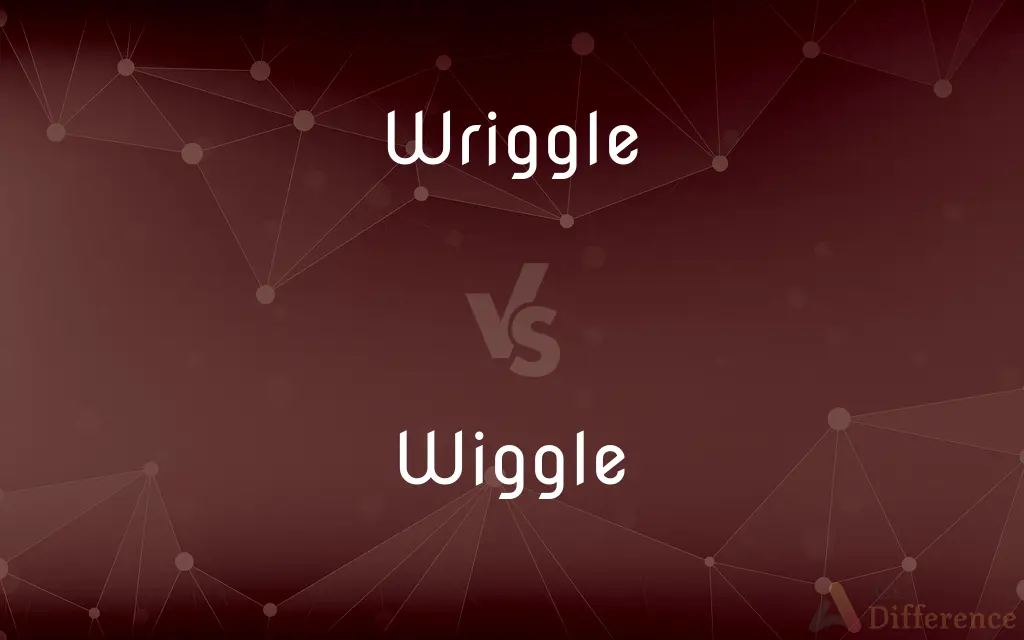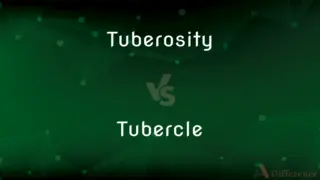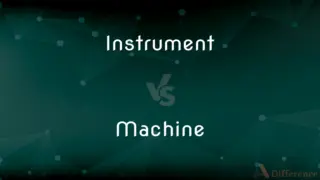Wriggle vs. Wiggle — What's the Difference?
By Tayyaba Rehman — Updated on November 6, 2023
"Wriggle" implies twisting and turning with quick movements, often to escape, while "wiggle" refers to moving side to side in a playful or gentle manner.

Difference Between Wriggle and Wiggle
Table of Contents
ADVERTISEMENT
Key Differences
Wriggle often conveys a sense of struggling or contorting the body, perhaps to get free from a constraint or tight space. It can suggest effort and purpose. Wiggle, however, tends to imply a more carefree, rhythmic movement from side to side or up and down, without the connotation of trying to get free from something.
The action to wriggle is usually more vigorous and can be seen in the context of someone trying to get comfortable in a chair or a small child trying to get out of their parent’s arms. To wiggle is generally less vigorous and can be as simple as someone playfully moving their toes or a dog happily wagging its tail.
In terms of physical effort, wriggling can be more full-bodied and involve multiple parts of the body working in tandem to achieve a particular goal, like wriggling through a narrow passage. Wiggling might involve isolated parts of the body, such as wiggling one's fingers to signal a playful invitation or gesture.
Usage of wriggle often appears in situations where there is a need to maneuver with some level of difficulty or skill, reflecting a certain level of intention. Wiggle is used in more casual, sometimes endearing circumstances and can reflect a spontaneous or instinctual action, like wiggling to a favorite song.
In essence, wriggling tends to be more complex and deliberate, whereas wiggling is simpler and more spontaneous. Both involve movement, but the context and intensity set them apart.
ADVERTISEMENT
Comparison Chart
Connotation
Struggling or twisting movements
Gentle or playful side-to-side movements
Intensity
Can imply vigorous effort
Usually implies a lighter, less intense action
Purpose
Often used to escape or get free from confinement
Often used for playful gestures or movements
Movement Complexity
Full-bodied and involves multiple parts
Can involve isolated body parts like hips or fingers
Context
Used in situations requiring maneuvering or escaping
Used in casual or endearing situations
Compare with Definitions
Wriggle
Wriggle means to twist to and fro with quick movements.
The rabbit managed to wriggle out of the garden fence.
Wiggle
Wiggle can mean to turn or twist with small, rapid movements.
He wiggled the key in the lock until it finally turned.
Wriggle
Wriggle implies a struggle to escape confinement.
The magician wriggled his wrists to slip the cuffs.
Wiggle
Wiggle often refers to carefree or rhythmic movements.
The dancers wiggled to the beat of the music.
Wriggle
Wriggle is to move the body in contorted or twisting motions.
The child tried to wriggle free from his mother's embrace.
Wiggle
Wiggle is to move parts of the body with playful or gentle jerks.
She wiggled her fingers to attract the baby's attention.
Wriggle
Wriggle denotes purposeful, often rapid movement.
He had to wriggle under the car to retrieve the ball.
Wiggle
To move back and forth with quick irregular motions
The gelatin wiggled on the plate.
Wriggle
Wriggle can mean to maneuver skillfully in a limited space.
She had to wriggle through the crowd to reach the front.
Wiggle
To move or proceed with a twisting or turning motion; wriggle
Wiggled restlessly in her chair.
Wiggled through the crowd.
Wriggle
To turn or twist the body or a body part with writhing motions
The rabbit's nose wriggled.
Wiggle
To insinuate or extricate oneself by sly or subtle means
Wiggled out of a social engagement.
Wriggle
To move or proceed with writhing motions
Wriggle into a sleeping bag.
Wriggled out of his grasp.
Wiggle
To cause to move back and forth with quick irregular motions
Wiggle a loose tooth.
Wriggle
To move with a wriggling motion
Wriggle a toe.
Wiggle
To make (one's way, for example) by or as if by wiggling
The pitcher wiggled his way out of a jam.
Wriggle
To make (one's way, for example) by or as if by wriggling
He wriggled his way into her good graces.
Wiggle
A wiggling movement or course.
Wriggle
A wriggling movement.
Wiggle
To move with irregular, back and forward or side to side motions; To shake or jiggle.
Her hips wiggle as she walks.
The jelly wiggles on the plate when you move it.
Wriggle
(intransitive) To twist one's body to and fro with short, writhing motions; to squirm.
Teachers often lose their patience when children wriggle in their seats.
Wiggle
A rapid movement in alternating opposite directions, not necessarily regular.
She walked with a sexy wiggle.
Wriggle
(transitive) To cause something to wriggle.
He was sitting on the lawn, wriggling his toes in the grass.
Wiggle
(figurative) An alternating state or characteristic. en
Wriggle
(intransitive) To use crooked or devious means.
Wiggle
(in the plural) See wiggles.
Wriggle
A wriggling movement.
Wiggle
To move to and fro with a quick, jerking motion; to bend rapidly, or with a wavering motion, from side to side; to wag; to squirm; to wriggle; as, the dog wiggles his tail; the tadpole wiggles in the water.
Wriggle
To move the body to and fro with short, writhing motions, like a worm; to squirm; to twist uneasily or quickly about.
Both he and successors would often wriggle in their seats, as long as the cushion lasted.
Wiggle
Act of wiggling; a wriggle.
Wriggle
To move with short, quick contortions; to move by twisting and squirming; like a worm.
Covetousness will wriggle itself out at a small hole.
Wriggling his body to recoverHis seat, and cast his right leg over.
Wiggle
The act of wiggling
Wriggle
Wriggling; frisky; pliant; flexible.
Wiggle
Move to and fro;
Don't jiggle your finger while the nurse is putting on the bandage!
Wriggle
Act of wriggling; a short or quick writhing motion or contortion.
Wiggle
Wiggle means to move side to side with short, quick motions.
The puppy wiggled its tail excitedly.
Wriggle
The act of wiggling
Wiggle
Wiggle implies a casual movement without serious intent.
She wiggled her toes in the warm sand.
Wriggle
To move in a twisting or contorted motion, (especially when struggling);
The prisoner writhed in discomfort
The child tried to wriggle free from his aunt's embrace
Common Curiosities
What does "wriggle" mean?
"Wriggle" means to twist and turn the body with quick, sometimes forceful movements.
Does "wiggle" suggest playfulness?
Yes, "wiggle" often conveys a playful or light-hearted action.
When do you use "wiggle"?
Use "wiggle" when describing light or playful movements, like wiggling one's toes.
Is "wriggle" always associated with difficulty?
Often, but not always, "wriggle" suggests maneuvering with effort or skill.
Does "wriggle" suggest speed?
"Wriggle" often implies quick movements, though not necessarily high speed.
Can you "wiggle" out of something like you "wriggle" out?
"Wiggle out" can be used informally, but it usually lacks the connotation of difficulty implied by "wriggle."
Can "wriggle" and "wiggle" be used interchangeably?
They are not typically interchangeable due to their different connotations and contexts.
Is "wriggle" used for animals as well as humans?
Yes, "wriggle" can describe the movements of both animals and humans.
What does "wiggle" mean?
"Wiggle" means to move with short and often playful side-to-side movements.
When do you use "wriggle"?
Use "wriggle" when describing movements intended to escape or move through tight spaces.
Is "wiggle" used in dance?
"Wiggle" can be used to describe dance movements that involve swaying or shaking the body in a light manner.
Do "wriggle" and "wiggle" have the same origin?
Both words likely have roots in Middle English, with similar meanings related to movement.
Are there idioms that use "wriggle" or "wiggle"?
Yes, "wriggle out of" is an idiom meaning to avoid or evade something, often a responsibility.
Can "wriggle" be a negative action?
It's not inherently negative, but it can be used in contexts where discomfort or urgency is involved.
Can "wiggle" indicate an attempt to attract attention?
Yes, "wiggle" can be used when trying to attract attention in a playful manner.
Share Your Discovery

Previous Comparison
Tuberosity vs. Tubercle
Next Comparison
Instrument vs. MachineAuthor Spotlight
Written by
Tayyaba RehmanTayyaba Rehman is a distinguished writer, currently serving as a primary contributor to askdifference.com. As a researcher in semantics and etymology, Tayyaba's passion for the complexity of languages and their distinctions has found a perfect home on the platform. Tayyaba delves into the intricacies of language, distinguishing between commonly confused words and phrases, thereby providing clarity for readers worldwide.













































